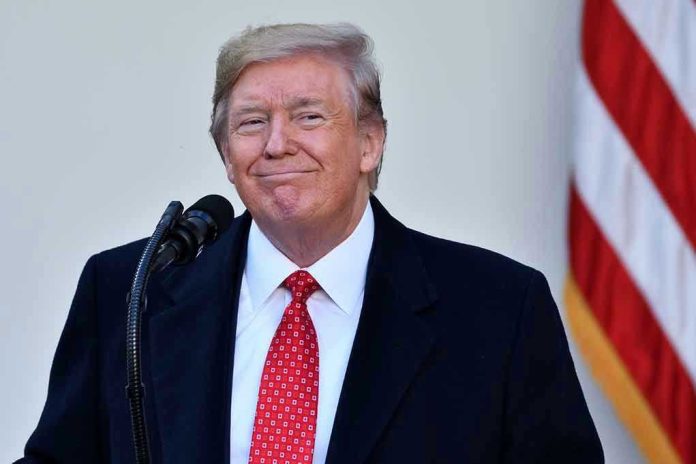
What happens when two ideological opposites decide to meet, not to quarrel, but to “work something out”? The answer could reshape the political chessboard of one of America’s most contentious cities.
Story Snapshot
- Trump signals a willingness to negotiate with New York’s newly elected progressive mayor, Zohran Mamdani.
- The meeting promises to blend sharply divergent political philosophies in a high-stakes urban laboratory.
- Trump’s olive branch comes after a campaign of opposition—raising questions about his motives and strategy.
- Conservatives and progressives alike watch with skepticism and curiosity, anticipating the potential fallout.
Trump Extends a Surprising Invitation to Mamdani
President Donald Trump, known for his combative style and unapologetic conservative values, stunned political observers Sunday by announcing plans to meet with Zohran Mamdani, the newly elected mayor of New York City. Mamdani, a progressive firebrand, swept into office on November 4 with promises to upend establishment politics. Until recently, Trump had rallied against Mamdani, urging his supporters to block the mayor-elect’s path to City Hall. Now, the president’s overture—a promise that “we’ll work something out”—raises eyebrows across partisan divides.
The apparent about-face suggests a tactical repositioning for Trump. Critics and allies alike speculate about his intent. Is this a genuine effort to find common ground, or a calculated move to undermine Mamdani’s agenda from within? The timing, coming on the heels of a contentious election, means the stakes are high for both leaders—and for the millions watching their next moves.
Political Philosophy Clash: What’s at Stake for New York?
New York City, often described as America’s crucible of diversity and dissent, now faces a moment where the city’s future may pivot on a single meeting. Mamdani’s progressive platform centers on affordable housing, aggressive climate action, and police reform. Trump’s priorities—economic growth, law and order, and a pro-business environment—often stand in direct opposition. The upcoming negotiation will force both leaders to defend their core philosophies.
For New Yorkers, the question is not just whether compromise is possible, but what form it could take. Would Trump concede on issues like police accountability or environmental regulation in exchange for a tougher stance on business taxes? Could Mamdani soften his rhetoric on redistribution to secure federal infrastructure funds? The answers will define whether this meeting is a historic turning point or a fleeting photo opportunity.
Conservative Values Put to the Test
Trump’s supporters, particularly those with deep conservative convictions, view the olive branch with skepticism. Many recall Trump’s initial opposition to Mamdani and question the wisdom of negotiating with a leader whose policies threaten traditional American values. For them, the risk lies in legitimizing progressive reforms that challenge the status quo, from policing to property rights.
Yet, some conservative voices argue that engagement is necessary. The logic is straightforward: influence is best wielded through dialogue, not isolation. By meeting Mamdani, Trump could steer the conversation toward pragmatic solutions, defending core conservative principles while forcing progressives to confront the practical limits of their vision. This delicate balancing act will determine whether Trump’s move is seen as statesmanship or capitulation.
Progressive Hopes and Fears
On the other side, Mamdani’s supporters hope the meeting will showcase their leader’s resolve and ability to broker real change. The mayor-elect’s platform is ambitious, and many see Trump’s overture as a chance to secure federal support for local initiatives. However, there is widespread concern that compromise could dilute the progressive agenda or entangle Mamdani in political gridlock.
The progressive movement in New York has thrived on grassroots activism and bold promises. Accepting Trump’s invitation could be viewed as selling out—or as a strategic step toward achieving lasting reform. For Mamdani, the challenge will be to maintain credibility with his base while navigating the treacherous waters of national politics.
The outcome of this meeting will ripple far beyond New York. Cities across America, grappling with similar divides, will watch to see if dialogue between political adversaries can yield genuine progress—or simply reinforce entrenched positions.
What Comes Next: Open Questions and Political Fallout
The open-ended nature of Trump’s offer—“We’ll work something out”—leaves observers guessing about what compromises might emerge. Will the meeting result in policy shifts, symbolic gestures, or a new era of bipartisan collaboration? Both leaders face intense scrutiny from their respective camps, with every word and gesture likely to be dissected for evidence of victory or defeat.
As New York prepares for this unprecedented summit, the rest of the country waits. The meeting could serve as a blueprint for future negotiations between ideological rivals—or as a cautionary tale about the limits of political rapprochement. Regardless of the outcome, the encounter between Trump and Mamdani promises to be one of the most closely watched events in American urban politics this year.
Sources:
Donald Trump Working on Zohran Mamdani Meeting

